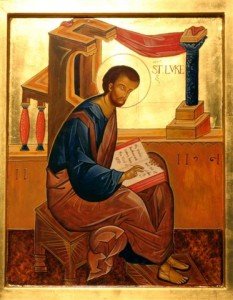 Another tradition, voiced by Eusebius as well as by Julius Africanus and the Monarchian prologue to Luke, identifies Luke’s hometown as Antioch on the Orontes. Granting that Luke is also the author of Acts, it is no surprise that he was aware of the church affairs in Antioch.
Another tradition, voiced by Eusebius as well as by Julius Africanus and the Monarchian prologue to Luke, identifies Luke’s hometown as Antioch on the Orontes. Granting that Luke is also the author of Acts, it is no surprise that he was aware of the church affairs in Antioch.
Luke appears rather unobtrusively and quite suddenly at Paul’s side during his second Mission. Sections of Acts indicate that Luke accompanied Paul from Troas to the seaport of Philippi in Greece. He remained at Philippi for six or seven years until Paul returned on his third Mission. Both men traveled by boat to Miletus and Caesarea. After landing at Caesarea they went to Jerusalem. Luke remained near Paul in Caesarea during his imprisonment. He went with Paul and Aristarchus on the perilous journey to Rome. Paul names Luke as one of his most faithful companions during the Roman house arrest. During this time at Rome, Luke may have made personal contact with Mark.
Later Christian tradition continues the life story of Luke, but its historical accuracy cannot be demonstrated. According to the Anti-Marcionite Prologue, Luke was unmarried, labored in Achaia and died at the age of 84. The traditions of his alleged martyrdom are unreliable. The Emperor Constantius II transferred his relics to Constantinople in 357 CE. A later legend tells of a second transfer (1177) to Padus, Italy.
In the 14th century it was believed that Luke was a gifted painter and the artist of a famous icon of Mary, now preserved in Rome. Another tradition, hardly acceptable, claims that Luke was one of the 72 disciples and also the unnamed disciple on the road to Emmaus.
Luke ushers the New Testament into the world of literary excellence. He moves with masterful control and delicate smoothness from the classical style of the Prologue to the strongly Hebraic tone of the Infancy Narrative to the heavily septuagintal pattern of the rest of his Gospel. In Acts he reverts to the classical style.
Luke writes with an observant eye to mannerisms, psychological reactions and hidden motivations. He alone gives the psychological setting for a number of the included stories. His pagan origin as well as his extensive traveling is probably responsible for his broadminded openness to all groups of peoples. He shows a favoritism for minorities, segregated groups and the underprivileged. They all receive special encouragement in his Gospel.
